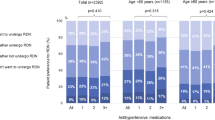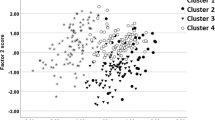Abstract
This study investigated patient preferences for renal denervation (RDN) therapy in hypertension patients in Chengdu, China. A questionnaire-based cross-sectional study was conducted between August and December 2020. First, we collected and analyzed information on demographics, the duration of hypertension, the presence or absence of medication, the medication regimen, the duration of medication, maximal and minimal blood pressure levels, self-reported comorbidities, the willingness of patients to choose RDN as a blood pressure control strategy, choice determinants and expectations for RDN. In total, 485 patients were interviewed, and 402 questionnaires were eligible for analysis. The mean age of the participants was 61 years, 53.9% of the participants were male, and 32.6% of the patients demonstrated a willingness to choose RDN as a blood pressure control strategy. The proportion of patients who were already on medication was 34.7%, whereas the proportion of those who were not on medication was 23.3%. Furthermore, 47.3% of the patients would choose RDN treatment if the procedure could decrease their blood pressure by over 20 mmHg, while no patient would choose the device treatment if their blood pressure would decrease by less than 5 mmHg. In addition, 56.5% of the patients expected that they could take one less medication after RDN. Approximately 70% of the patients expected that RDN could consistently decrease their blood pressure for at least 15 years. In summary, among hypertensive patients in Chengdu, an estimated one-third were willing to choose RDN therapy as a blood pressure control approach; these patients were younger, more likely to be male, took more antihypertensive drugs, and had concomitant metabolic disorders. The perspectives of patients on RDN were not dependent on their education levels; also, their expectations for RDN were high.
This is a preview of subscription content, access via your institution
Access options
Subscribe to this journal
Receive 12 print issues and online access
$259.00 per year
only $21.58 per issue
Buy this article
- Purchase on Springer Link
- Instant access to full article PDF
Prices may be subject to local taxes which are calculated during checkout


Similar content being viewed by others
References
GBD 2016 Risk Factors Collaborators. Global, regional, and national comparative risk assessment of 84 behavioural, environmental and occupational, and metabolic risks or clusters of risks, 1990–2016: a systematic analysis for the Global Burden of Disease Study 2016. Lancet. 2017;390:1345–422. https://doi.org/10.1016/S0140-6736(17)32366-8.
Kandzari DE, Böhm M, Mahfoud F, Townsend RR, Weber MA, Pocock S. et al. Effect of renal denervation on blood pressure in the presence of antihypertensive drugs: 6-month efficacy and safety results from the SPYRAL HTN-ON MED proof-of-concept randomised trial. Lancet. 2018;391:2346–55. https://doi.org/10.1016/S0140-6736(18)30951-6.
Böhm M, Kario K, Kandzari DE, Mahfoud F, Weber MA, Schmieder RE. et al. Efficacy of catheter-based renal denervation in the absence of antihypertensive medications (SPYRAL HTN-OFF MED Pivotal): a multicentre, randomised, sham-controlled trial. Lancet. 2020;395:1444–51. https://doi.org/10.1016/S0140-6736(20)30554-7.
Fengler K, Rommel KP, Blazek S, Besler C, Hartung P, von Roeder M. et al. A three-arm randomized trial of different renal denervation devices and techniques in patients with resistant hypertension (RADIOSOUND-HTN). Circulation. 2019;139:590–600. https://doi.org/10.1161/CIRCULATIONAHA.118.037654.
Schmieder RE, Högerl K, Jung S, Bramlage P, Veelken R, Ott C. Patient preference for therapies in hypertension: a cross-sectional survey of German patients. Clinical research in cardiology: official journal of the German Cardiac. Society. 2019;108:1331–42. https://doi.org/10.1007/s00392-019-01468-0.
Schmieder RE, Kandzari DE, Wang TD, Lee YH, Lazarus G, Pathak A. Differences in patient and physician perspectives on pharmaceutical therapy and renal denervation for the management of hypertension. J Hypertens. 2021;39:162–8. https://doi.org/10.1097/HJH.0000000000002592.
Schmieder RE, Mahfoud F, Mancia G, Azizi M, Böhm M, Dimitriadis K. et al. European Society of Hypertension position paper on renal denervation 2021. J Hypertens. 2021;39:1733–41. https://doi.org/10.1097/HJH.0000000000002933.
Kario K, Kagitani H, Hayashi S, Hanamura S, Ozawa K, Kanegae H. A Japan nationwide web-based survey of patient preference for renal denervation for hypertension treatment. Hypertension Res: Off J Jpn Soc Hypertension. 2022;45:232–40. https://doi.org/10.1038/s41440-021-00760-9.
Mahfoud F, Schlaich M, Kindermann I, Ukena C, Cremers B, Brandt MC. et al. Effect of renal sympathetic denervation on glucose metabolism in patients with resistant hypertension: a pilot study. Circulation. 2011;123:1940–6. https://doi.org/10.1161/CIRCULATIONAHA.110.991869.
Pourmoghaddas M, Khosravi A, Akhbari M, Akbari M, Pourbehi M, Ziaei F, et al. One year follow-up effect of renal sympathetic denervation in patients with resistant hypertension. ARYA Atheroscler. 2016;12:109–13.
Witkowski A, Prejbisz A, Florczak E, Kądziela J, Śliwiński P, Bieleń P. et al. Effects of renal sympathetic denervation on blood pressure, sleep apnea course, and glycemic control in patients with resistant hypertension and sleep apnea. Hypertension. 2011;58:559–65. https://doi.org/10.1161/HYPERTENSIONAHA.111.173799.
Beaney T, Schutte AE, Stergiou GS, Borghi C, Burger D, Charchar F. et al. May measurement month 2019: the global blood pressure screening campaign of the international society of hypertension. Hypertension. 2020;76:333–41. https://doi.org/10.1161/HYPERTENSIONAHA.120.14874.
Burnier M, Egan BM. Adherence in hypertension. Circulation Res. 2019;124:1124–40. https://doi.org/10.1161/CIRCRESAHA.118.313220.
Vrijens B, Vincze G, Kristanto P, Urquhart J, Burnier M. Adherence to prescribed antihypertensive drug treatments: longitudinal study of electronically compiled dosing histories. BMJ. 2008;336:1114–7. https://doi.org/10.1136/bmj.39553.670231.25.
Mahfoud F, Böhm M, Schmieder R, Narkiewicz K, Ewen S, Ruilope L. et al. Effects of renal denervation on kidney function and long-term outcomes: 3-year follow-up from the Global SYMPLICITY Registry. Eur Heart J. 2019;40:3474–82. https://doi.org/10.1093/eurheartj/ehz118.
Kario, K, Yokoi, Y, Okamura, K, Fujihara, M, Ogoyama, Y, Yamamoto, E, et al. (2021). Catheter-based ultrasound renal denervation in patients with resistant hypertension: the randomized, controlled REQUIRE trial. Hypertension Research. 2021. https://doi.org/10.1038/s41440-021-00754-7. Accessed 15 Oct 2021.
Glybochko PV, Svetankova AA, Rodionov AV, Maltseva AS, Sulimov VA, Fomin VV. Renal denervation with a resistant arterial hypertension: the results of a five-year follow-up. Terapevticheskii Arkhiv. 2018;90:88–91. https://doi.org/10.26442/terarkh201890988-91.
Dong, Zhao. (2021). Epidemiological features of cardiovascular disease in Asia. JACC: Asia. 2021;1:1–13. https://doi.org/10.1016/j.jacasi.2021.04.007.
Arima H, Murakami Y, Lam TH, Kim HC, Ueshima H, Woo J. et al. Effects of prehypertension and hypertension subtype on cardiovascular disease in the Asia-Pacific Region. Hypertension. 2012;59:1118–23. https://doi.org/10.1161/HYPERTENSIONAHA.111.187252.
Kario K, Kim BK, Aoki J, Wong AY, Lee YH, Wongpraparut N. et al. Renal denervation in asia: consensus statement of the asia renal denervation consortium. Hypertension. 2020;75:590–602. https://doi.org/10.1161/HYPERTENSIONAHA.119.13671.
Kim BK, Böhm M, Mahfoud F, Mancia G, Park S, Hong MK. et al. Renal denervation for treatment of uncontrolled hypertension in an Asian population: results from the Global SYMPLICITY Registry in South Korea (GSR Korea). J Hum Hypertension. 2016;30:315–21. https://doi.org/10.1038/jhh.2015.77.
Acknowledgements
We acknowledge Professor Xiongjing Jiang and Professor Xiaoping Chen for their promotion of the RDN technique and related research in West China Hospital.
Author information
Authors and Affiliations
Corresponding author
Ethics declarations
Conflict of interest
The authors declare no competing interests.
Additional information
Publisher’s note Springer Nature remains neutral with regard to jurisdictional claims in published maps and institutional affiliations.
Rights and permissions
About this article
Cite this article
Zhang, Z., Zhang, X., Ye, R. et al. Patient preference for renal denervation therapy in hypertension: A cross-sectional survey in Chengdu, China. Hypertens Res 45, 954–961 (2022). https://doi.org/10.1038/s41440-022-00912-5
Received:
Revised:
Accepted:
Published:
Issue Date:
DOI: https://doi.org/10.1038/s41440-022-00912-5
Keywords
This article is cited by
-
Impact of renal denervation on quality of life how does renal denervation contribute to improving hypertension treatment affected by poor medication adherence?
Hypertension Research (2024)
-
2023 update and perspectives
Hypertension Research (2024)
-
Long-term blood pressure lowering effect of renal denervation and its patient preference, salt intake, and stroke in Asia
Hypertension Research (2022)
-
Patient preference and Long-term outcome of renal denervation for resistant hypertension
Hypertension Research (2022)



